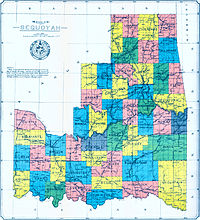State of Sequoyah
| State of Sequoyah | |
|---|---|

The State Seal
|
|

Proposed State of Sequoyah
|
|
| Constitutional convention: | August 21, 1905 |
| Convention President: | Pleasant Porter |
| Vice President(s) |
William C. Rogers, Cherokee |
| Statehood | |
| Approved 1905 by referendum. Denied by United States Congress. Became part of State of Oklahoma in 1907. |
|
William C. Rogers, Cherokee
William H. Murray, Chickasaw
Green McCurtain, Choctaw
John Brown, Seminole
The State of Sequoyah was a proposed state to be established from the Indian Territory in the eastern part of present-day Oklahoma. In 1905, with the end of tribal governments looming (as prescribed by the Curtis Act of 1898),Native Americans of the Five Civilized Tribes—the Cherokee, Chickasaw, Choctaw, Creek (Muscogee), and Seminole—in Indian Territory proposed to create a state as a means to retain control of their lands. Their intention was to have a state under Native American constitution and governance. The proposed state was to be named in honor of Sequoyah, the Cherokee who created a writing system in 1825 for the Cherokee language.
From 1890, when Congress passed the Oklahoma Organic Act, the land that now forms the State of Oklahoma was made up of two separate territories: Oklahoma Territory to the west, and the Indian Territory to the east. The Indian Territory had a large Native American population. The territory had been reduced by required land cessions after the Civil War; land runs; and through other treaties with the United States. In the 1900 US Census, Native Americans composed 13.4 percent of the population in the future state. In 1905, the Five Civilized Tribes had a total of about 60,000 persons in the Indian Territory out of a total population of 600,000.
...
Wikipedia
